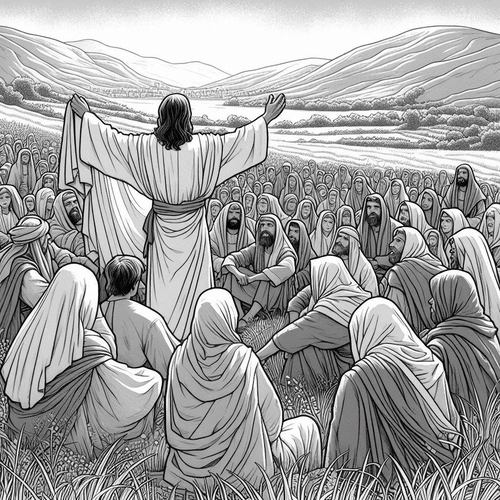Sacred Sorrow: Why Jesus Calls Mourning a Blessing
MAKING SENSE OF THE DIVINE PARADOX IN MATTHEW 5:4
When Jesus declared, “Blessed are those who mourn, for they will be comforted,” He spoke words that make no sense to our modern ears. We live in a culture obsessed with happiness, where grief is medicated, mourning is rushed, and sorrow is seen as a problem to be solved rather than a pathway to be walked. Yet here stands Christ, calling mourners blessed—not pitied, not unfortunate, but genuinely blessed by God.
How can this be? The very idea seems to mock our understanding of what it means to be blessed. This isn’t mere philosophical speculation; it’s a promise that touches the deepest aches of human existence. And understanding it requires us to enter the upside-down logic of God’s kingdom.
WHY THIS SEEMS SO WRONG
Our natural instinct rebels against this beatitude because everything in us associates blessing with prosperity, health, success, and happiness. Mourning, on the other hand, represents loss, pain, vulnerability, and failure. In our minds, these categories are mutually exclusive. Blessed people don’t mourn; mourning people can’t be blessed.
This thinking runs deeper than mere cultural conditioning—it reflects our fallen nature’s distorted understanding of reality. Sin has corrupted not just our actions but our ability to perceive spiritual truth. We naturally flee from anything that exposes our neediness and dependence, preferring the illusion of self-sufficiency to the reality of our frailty.
Modern society reinforces this distortion through what psychologists now call “toxic positivity”—the relentless pressure to maintain a cheerful façade regardless of circumstances. We’re told to “look on the bright side,” “think positive thoughts,” and “move on” from loss as quickly as possible. This cultural script not only fails those who are genuinely suffering but perpetuates the very misunderstanding Jesus came to correct.
WHAT KIND OF MOURNING IS BLESSED?
Not all mourning leads to blessing. Scripture distinguishes between “worldly grief” that “produces death” and “godly sorrow” that “brings repentance that leads to salvation” (2 Corinthians 7:10). The difference isn’t found in the intensity of the emotion but in the direction it takes our hearts. Jesus blesses three distinct types of mourning:
- Mourning over our own sin—the deep grief that comes from recognising how our rebellion has wounded others and dishonoured God. This isn’t mere regret over consequences but genuine brokenness over the corruption of our hearts. As the psalmist wrote, “The sacrifices of God are a broken spirit; a broken and contrite heart, O God, you will not despise” (Psalm 51:17).
- Mourning over a broken world—the compassionate grief we feel when confronted with suffering and injustice. This is the sorrow that moved Jesus to weep over Jerusalem, knowing the destruction that awaited a city that had rejected its Messiah. It’s the righteous indignation that drives us not to despair but to action, motivated by love rather than mere sentiment.
- Mourning in personal loss and suffering—grief over death, illness, broken relationships, and the thousand smaller deaths we experience in a fallen world. This mourning becomes blessed not because suffering is good in itself, but because of how God meets us in our pain.
The crucial element isn’t the mourning itself but the heart’s posture. Mourning that drives us toward God in dependence and faith becomes a pathway to blessing. Mourning that drives us away from God in bitterness and despair leads only to deeper darkness.
HOW MOURNING BECOMES BLESSING
God’s kingdom operates on radically different principles than worldly systems. What appears weak becomes strong, what seems foolish becomes wise, and what looks cursed becomes blessed. The cross itself demonstrates this divine reversal—an instrument of torture and shame transformed into the symbol of ultimate victory and grace.
In God’s economy, mourning becomes blessing because:
- It exposes our desperate need for grace. Pride and self-reliance are the great enemies of faith, keeping us from recognising our dependence on God. Mourning strips away these pretences, creating what Jesus calls “poverty of spirit”—the recognition that we have nothing to offer God but our need.
- This spiritual poverty opens us to receive divine comfort. When Jesus promises mourners “will be comforted,” He’s offering more than mere consolation. The Greek word parakletos suggests someone called alongside to help—the same word used for the Holy Spirit. God doesn’t just sympathise with our sorrow; He enters into it, providing strength and presence that transforms our experience of grief.
- Mourning also develops Christian character in ways that ease and prosperity never could. The apostle Paul explains that “suffering produces endurance, and endurance produces character, and character produces hope” (Romans 5:3-4). This isn’t masochistic theology but recognition of a spiritual principle: souls are formed in the crucible of difficulty, not in the comfort of convenience.
- Mourning connects us to Christ’s own suffering. Jesus is called “a man of sorrows, and acquainted with grief” (Isaiah 53:3). Our mourning doesn’t mystically add to His finished work, but it does allow us to enter into fellowship with His sufferings, which Paul describes as a pathway to experiencing “the power of his resurrection” (Philippians 3:10).
There’s also an eschatological dimension to this blessing. The comfort God provides now is real but partial, pointing forward to the ultimate consolation when “he will wipe every tear from their eyes” and “death shall be no more” (Revelation 21:4). This future hope doesn’t minimise present sorrow but transforms it, allowing us to grieve with hope rather than despair.
LIVING THE BLESSED MOURNING
Understanding this beatitude should transform how we approach both our own grief and the sorrow of others.
First, it gives us permission to mourn authentically. False spirituality that denies legitimate sorrow isn’t faith—it’s denial. Jesus wept at Lazarus’s tomb even though He knew resurrection was coming. Grief isn’t a lack of faith; it’s an acknowledgment of love and loss in a broken world.
Second, it calls us to comfort others as we’ve been comforted. Paul reminds us that God “comforts us in all our troubles, so that we can comfort those in any trouble with the comfort we ourselves receive from God” (2 Corinthians 1:4). The church should be a community of wounded healers, where those who have experienced God’s comfort in affliction minister to others still walking through the valley.
Finally, it anchors us in hope that transcends circumstances. Christians don’t mourn “like the rest of mankind, who have no hope” (1 Thessalonians 4:13). Our grief is real but not ultimate; our sorrow is deep but not permanent. The gospel doesn’t eliminate mourning but transforms it, promising that our present light affliction is preparing for us “an eternal weight of glory beyond all comparison” (2 Corinthians 4:17).
WHY JESUS CALLS MOURNING A BLESSING: THE MYSTERY OF GRACE
This beatitude remains mysterious because it reveals something fundamental about God’s character and kingdom. In a world that equates blessing with ease and sorrow with curse, Jesus announces God specialises in bringing blessing through what appears to be its opposite. This isn’t mere paradox but profound grace—God’s ability to meet us in our deepest need and transform our greatest weakness into unexpected strength.
Our mourning, whatever its source, isn’t forgotten by God. In His upside-down kingdom, the tears we shed today may become the very pathway through which His greatest blessings flow. This is the sacred mystery of sorrow: that in God’s hands, even our grief becomes a gift.
WHY JESUS CALLS MOURNING A BLESSING: RELATED FAQs
Does this beatitude mean Christians should seek out suffering or feel guilty about being happy? Absolutely not. This beatitude doesn’t glorify suffering for its own sake or suggest joy is unspiritual. We affirm God gives us “all things richly to enjoy” (1 Timothy 6:17). The blessing comes not from pursuing mourning but from receiving God’s grace when mourning inevitably comes through living in a fallen world.
- How do we interpret “they shall be comforted”? Leading Reformed theologians like John Piper emphasise the comfort promised is both present and eschatological—real consolation now through the Holy Spirit’s presence, and ultimate comfort in the new creation. DA Carson notes the passive voice (“shall be comforted”) indicates God as the agent of comfort, not merely human sympathy. Tim Keller frequently pointed to this beatitude as evidence of how the gospel reframes our understanding of weakness and strength.
- What’s the difference between biblical lament and sinful despair? Biblical lament maintains faith while expressing honest grief, as seen throughout the Psalms where complaint is directed toward God rather than away from Him. Despair, by contrast, abandons hope and often leads to bitterness or self-destructive behaviour. Reformed tradition sees lament as a form of prayer that trusts God’s character even when His ways are mysterious.
How does this relate to the Reformed doctrine of sanctification? This beatitude illustrates the Reformed teaching that God uses ordinary means—including suffering—to conform believers to Christ’s image. Mourning becomes a tool of sanctification when it drives us to depend more fully on God’s grace. As John Owen wrote, afflictions are God’s way of “weaning” us from earthly attachments and deepening our spiritual maturity.
- What about those who seem to mourn but never find comfort—how do we explain their experience? Reformed theology recognises comfort may be delayed or take different forms than we expect, and that some mourning in this life may only find complete resolution in glory. However, the promise remains certain for all who mourn in faith. Sometimes what appears to be absence of comfort is actually God’s deeper work of spiritual formation that becomes clear only in retrospect.
- How does this beatitude apply to clinical depression or mental illness? Reformed scholars increasingly recognise brain chemistry affects our emotional experience, and mental illness isn’t simply a spiritual problem requiring only spiritual solutions. The comfort Jesus promises can include medical treatment, counselling, and community support alongside spiritual care. Mourning due to mental illness can still be a pathway to experiencing God’s grace through various means of healing.
Why is mourning listed so early in the Beatitudes—what’s the significance of its placement? The order of the Beatitudes reflects a spiritual progression. After “poverty of spirit” (recognising our spiritual bankruptcy), mourning naturally follows as we grieve over our sin and the world’s brokenness. Reformed theologian Sinclair Ferguson notes this sequence shows how authentic Christian experience begins with acknowledging our desperate need before moving toward the hope and transformation described in later beatitudes.
WHY JESUS CALLS MOURNING A BLESSING: OUR RELATED POSTS
Editor's Pick

Why Do People Hate the Doctrine of Election?
…WHEN THEY REALLY SHOULDN’T Few Bible doctrines provoke stronger reactions than election. The idea that God chose some for salvation [...]

The Doctrine of Providence: Does God Really Govern All Things?
You’re sitting in the doctor’s office when the diagnosis lands like a thunderclap. Your mind races: Why this? Why now? [...]

No Decay, No Defeat: What It Means That Christ’s Body Saw No Corruption
On the Day of Pentecost, Peter stood before thousands and made a startling claim: David's body decayed in the tomb, [...]
SUPPORT US:
Feel the Holy Spirit's gentle nudge to partner with us?
Donate Online:
Account Name: TRUTHS TO DIE FOR FOUNDATION
Account Number: 10243565459
Bank IFSC: IDFB0043391
Bank Name: IDFC FIRST BANK






